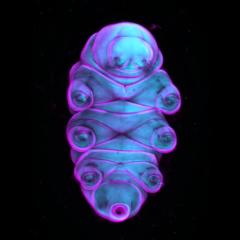The discovery of a Stone Age man with the genes for blue eyes and dark skin has revealed that blue eye colour likely spread through the European population before fair skin.
The discovery, published in world-leading scientific journal Nature, was made by an international team of researchers, including Associate Professor Rick Sturm from The University of Queensland’s Institute for Molecular Bioscience.
The team analysed the genome from the tooth of a 7000-year-old human skeleton from Spain to understand the evolutionary impact of early humans transitioning from hunter-gatherers to an agricultural society.
“Although these populations died out thousands of years ago, their genes have left clues to the way they looked and lived,” Dr Sturm, from UQ’s Institute for Molecular Bioscience (IMB), said.
“We found that the genes present in this Mesolithic man were likely to result in dark skin and dark hair, but blue eyes.
“This gene combination is unique and no longer exists in contemporary Europeans, suggesting that the spread of genes associated with a light eye colour may have occurred before the spread of genes for light skin.”
The team, led by researchers from the Institute of Evolutionary Biology in Spain and the University of Copenhagen in Denmark, also investigated genes associated with immunity and diet.
“This Mesolithic hunter-gatherer carried the gene for lactose-intolerance consistent with an inability to digest diary products, and also saliva amylase genes indicative of a low-starch diet,” Dr Sturm said.
“This is in direct contrast to genomes from Neolithic farmers, who could process higher levels of lactose in milk and starch in grains.
“However, the genes for immunity to diseases were similar between the hunter-gatherer and farmers, suggesting that the transition to agriculture in European populations caused a change in diet but not immunity.”
To make a tax-deductible donation to IMB gene research, visit www.imb.uq.edu.au/donate or call +61 (07) 3346 2134.
The Institute for Molecular Bioscience (IMB) is a research institute of The University of Queensland that aims to improve quality of life by advancing medical genomics, drug discovery and biotechnology.
Media contact: Bronwyn Adams, IMB Communications, 07 3346 2134, 0418 575 247 or b.adams@imb.uq.edu.au



